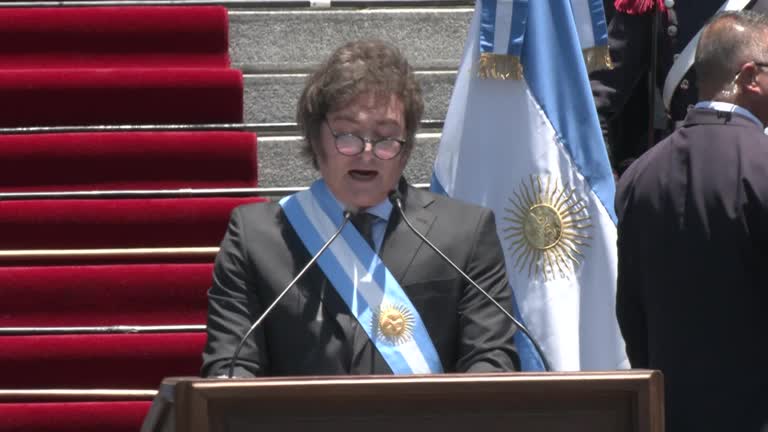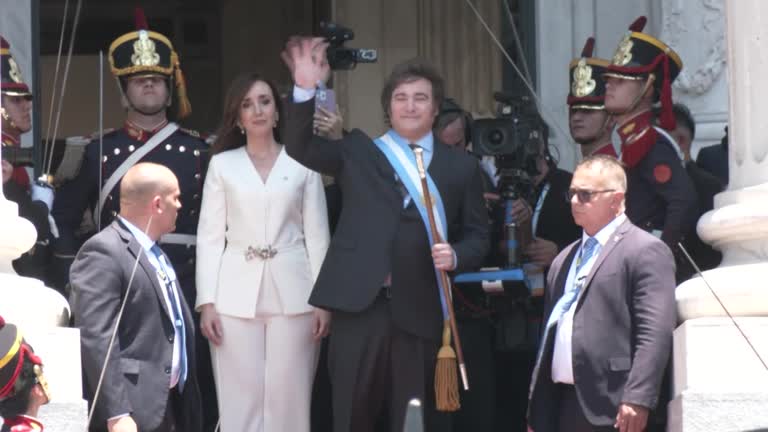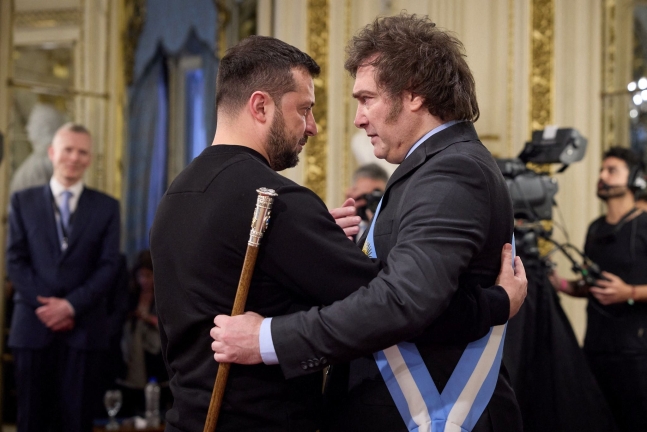
Javier Milay, 53, who was elected president on the 10th (local time) to reform the terrible economic difficulties caused by left-wing populism in Argentina for a long time, took office. Milay, who has put forward public spending cuts as his core policy, signed a decree for the first time that calls for halving the number of government ministries as president, heralding intense reforms from his first day in office.
Milay took over the shoulder strap from his predecessor Alberto Fernandez at the Federal Assembly in Buenos Aires, the capital, and officially took over as president, starting his four-year term. “There is no government that has received a worse legacy (from the former government),” Milay said in his inaugural address. “We will have to fight desperately to eradicate inflation, which can reach 15,000 percent every year.”
Milay defined the current state as a “phase of decay and decline,” emphasizing that the reform process will inevitably involve pain for the time being and that the belt should be tightened. “It will negatively affect the number of economic activities, employment, the poor and the poor in the early stages of his inauguration,” he said. “There will be stagflation, but it will not be much different from the past 12 years, and this is the last straw to start rebuilding Argentina.”
In particular, he stressed that public spending should be adjusted as the top priority to overcome economic difficulties. “There is no money in the country,” he said. “It is not free for a full-time government to issue more than 20 percent of its gross domestic product (GDP) to make up for the deficit in public spending, and we will pay for it with inflation.”

As Milay pointed out, the previous regime increased the national debt by $96.226 billion (about 124 trillion won) for four years by overspending unsustainable public sector subsidies and various welfare benefits for four years. As the deficit was blocked by the government-controlled central bank’s “unprinting money,” the amount of money released on the market more than quadrupled during the four years in power. As a result, the annual inflation rate soared to 142% as of October and rose 844% over the entire period of the previous regime.
Deepening economic difficulties has led to various social problems. The poverty rate increased from 35 percent to 40 percent over the past four years, with the figure rising by five percentage points to 56 percent, compared with the previous year. Although the government poured money into public education, half of students under the age of 15 lacked basic literacy skills.
The crime rate has also risen, and security has worsened, especially as Rosario, the third city and home of soccer player Lionel Messi, has become the base of a drug gang, with drug trafficking going rampant across the country. In a speech, Milay warned, “Argentina is bloodied and criminals are free to roam,” adding, “We will no longer leave criminals and drug traffickers alone.”
In his speech, Milay did not specify measures to be implemented in the early days of his administration. However, as soon as he took office, he signed a bill that would reduce the existing 18 ministries of government to nine ministries, expressing his commitment to intensive reform in the future. The bill calls for integrating the existing Ministry of Education, Labor, Women’s and Culture into human resources headquarters and placing the Ministry of Tourism, the Ministry of Environment and the Ministry of Sustainable Development under the Ministry of Home Affairs.

The inauguration ceremony was attended by heads of neighboring countries, including Chilean President Gabriel Boric, Uruguayan President Lacaye Pouw, as well as foreign figures, including Spanish King Felipe VI and Ukrainian President Volodymyr Zelensky. Former Brazilian President Jair Bolsonaro who is close to Milay personally was also present. In Korea, Bang Ki-sun, head of the Office of Government Policy Coordination, attended the ceremony as special envoy. Meanwhile, the Peronists, who were forced to resign due to economic difficulties, left forlornly. Members of the coalition for the motherland, the ruling party’s former Peronist, remained silent throughout the inauguration ceremony with firm faces. Notably, former Vice President Cristina Fernandez (2007-2015), who retired on the day, was controversial by swearing with her fingers at the crowd booing her when entering the inauguration ceremony. Christina, who served as the president from 2007 to 2015, has been cited as the person responsible for economic difficulties as she exerted considerable influence behind the scenes as the vice president in the previous administration.
JULIE KIM
US ASIA JOURNAL



